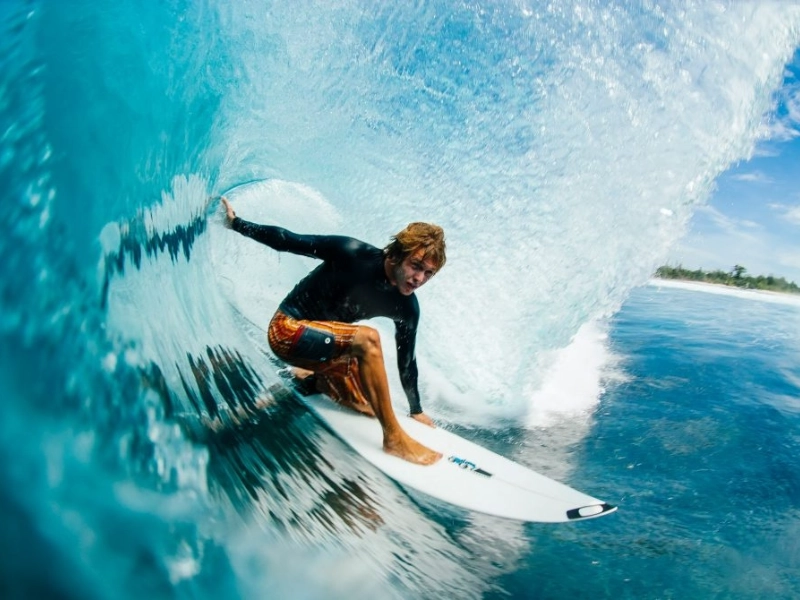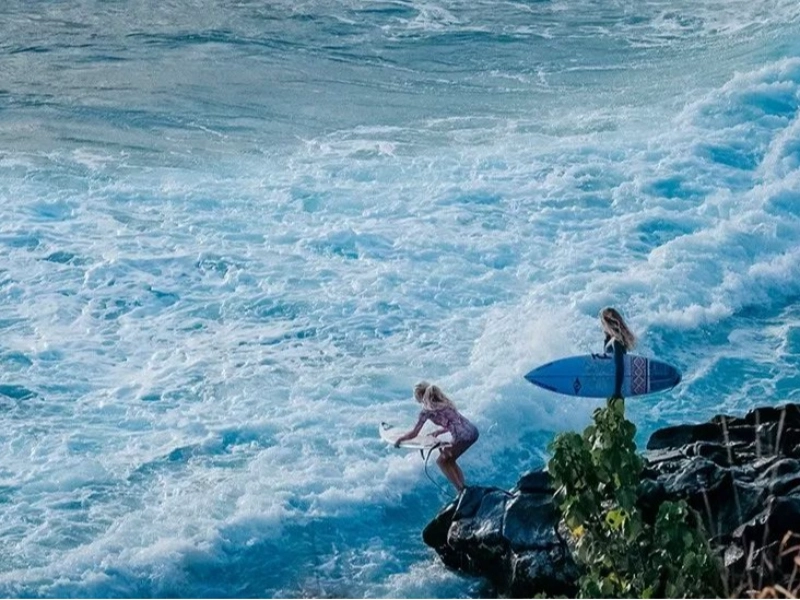Surfers who experience ocean-related anxiety and phobias must first address them at their most basic levels to avoid panic. This is what will finally enable them to grow and come to trust the water. If a surfer has gone through one or more particularly horrific events, this will cause subconscious programming that causes a fear reaction anytime surfing is discussed or specific conditions are present.

 Many people find surfing to be hypnotic because of its energising surge of adrenaline and link to the force of the ocean. But given the height of waves and erratic character of the water, it can also cause anxiety among novices.
Visualising helps one to get over this anxiety. Reversing technical skills in the brain helps one to see them, so enhancing them. High-performance athletes that wish to maximise their potential follow a regular habit.
Look for a quiet, cosy area where you may relax and concentrate on your breath to do a visual exercise. Imagine then a desired result or situation. For instance, see yourself effectively performing a certain surfing manoeuvre, such as a bottom turn, to help you to master it.
Furthermore noteworthy is the fact that visualisation is not a silver bullet for anxiety symptoms. By use of proactive actions, deep breathing exercises, concentration on technique, and error learning, you can still learn how to face your anxieties.
Many people find surfing to be hypnotic because of its energising surge of adrenaline and link to the force of the ocean. But given the height of waves and erratic character of the water, it can also cause anxiety among novices.
Visualising helps one to get over this anxiety. Reversing technical skills in the brain helps one to see them, so enhancing them. High-performance athletes that wish to maximise their potential follow a regular habit.
Look for a quiet, cosy area where you may relax and concentrate on your breath to do a visual exercise. Imagine then a desired result or situation. For instance, see yourself effectively performing a certain surfing manoeuvre, such as a bottom turn, to help you to master it.
Furthermore noteworthy is the fact that visualisation is not a silver bullet for anxiety symptoms. By use of proactive actions, deep breathing exercises, concentration on technique, and error learning, you can still learn how to face your anxieties.
 Tell yourself that the fear you are experiencing riding a wave is not insurmount. Even the most seasoned surfers have days when they feel bad; nonetheless, they still go for a session since they know their objective is to finish on top form.
When you're feeling a little off, you can also use breathing techniques and self-talk to straighten yourself. Many athletes follow a ritual before a performance to help them centre themselves; hence, pay attention to the pros and apply anything you can to bring yourself back on track.
Working on being more at ease underwater will also help you to conquer your anxiety. Try to resist the need to force your way to the surface when you are caught under by a wave; instead, spend a few seconds seated there. You will be able to relax as this will drain some of the wave of force.
Tell yourself that the fear you are experiencing riding a wave is not insurmount. Even the most seasoned surfers have days when they feel bad; nonetheless, they still go for a session since they know their objective is to finish on top form.
When you're feeling a little off, you can also use breathing techniques and self-talk to straighten yourself. Many athletes follow a ritual before a performance to help them centre themselves; hence, pay attention to the pros and apply anything you can to bring yourself back on track.
Working on being more at ease underwater will also help you to conquer your anxiety. Try to resist the need to force your way to the surface when you are caught under by a wave; instead, spend a few seconds seated there. You will be able to relax as this will drain some of the wave of force.
 Along with connecting with nature, getting a sense of accomplishment, and being part of a community, surfing is a terrific approach to help one relax. It is also a physically demanding sport that calls both mindfulness and focus.
Remember that the ocean is erratic and that fear is a natural human reaction to supposed threat. Overcoming surfing worries and concerns might be challenging, but if you go gently and have a strategy in place it is doable.
While learning how to relax is also vital, breathing methods are a fantastic tool for conquering surf fear. You should use a technique that feels best for your body as there are various relaxing activities available. Usually more helpful are longer relaxations; if needed, shorter ones might be used. This can help avoid homeostasis and turn off the amygdala, therefore facilitating the coping with surfing worries and anxiety.
Along with connecting with nature, getting a sense of accomplishment, and being part of a community, surfing is a terrific approach to help one relax. It is also a physically demanding sport that calls both mindfulness and focus.
Remember that the ocean is erratic and that fear is a natural human reaction to supposed threat. Overcoming surfing worries and concerns might be challenging, but if you go gently and have a strategy in place it is doable.
While learning how to relax is also vital, breathing methods are a fantastic tool for conquering surf fear. You should use a technique that feels best for your body as there are various relaxing activities available. Usually more helpful are longer relaxations; if needed, shorter ones might be used. This can help avoid homeostasis and turn off the amygdala, therefore facilitating the coping with surfing worries and anxiety.